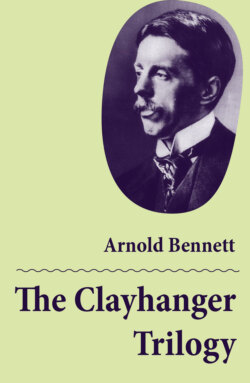Читать книгу The Clayhanger Trilogy (Consisting of Clayhanger + Hilda Lessways + These Twain) - Arnold Bennett - Страница 156
На сайте Литреса книга снята с продажи.
Two.
ОглавлениеShe conducted him to the so-called breakfast-room and shut the door on him. It was a small chamber behind the drawing-room, and shabbier than the drawing-room. In earlier days the children had used it for their lessons and hobbies. And now it was used as a sitting-room when mere cosiness was demanded by a decimated family. Edwin stooped down and mended the fire. Then he went to the wall and examined a framed water-colour of the old Sytch Pottery, which was signed with his initials. He had done it, aided by a photograph, and by Johnnie Orgreave in details of perspective, and by dint of preprandial frequentings of the Sytch, as a gift for Mrs Orgreave. It always seemed to him to be rather good.
Then he bent to examine bookshelves. Like the hall, the drawing-room, and the dining-room, this apartment too was plenteously full of everything, and littered over with the apparatus of various personalities. Only from habit did Edwin glance at the books. He knew their backs by heart. And books in quantity no longer intimidated him. Despite his grave defects as a keeper of resolves, despite his paltry trick of picking up a newspaper or periodical and reading it all through, out of sheer vacillation and mental sloth, before starting serious perusals, despite the human disinclination which he had to bracing himself, and keeping up the tension, in a manner necessary for the reading of long and difficult works, and despite sundry ignominious backslidings into original sluggishness—still he had accomplished certain literary adventures. He could not enjoy “Don Juan.” Expecting from it a voluptuous and daring grandeur, he had found in it nothing whatever that even roughly fitted into his idea of what poetry was. But he had had a passion for “Childe Harold,” many stanzas of which thrilled him again and again, bringing back to his mind what Hilda Lessways had said about poetry. And further, he had a passion for Voltaire. In Voltaire, also, he had been deceived, as in Byron. He had expected something violent, arid, closely argumentative; and he found gaiety, grace, and really the funniest jokes. He could read “Candide” almost without a dictionary, and he had intense pride in doing so, and for some time afterwards “Candide” and “La Princesse de Babylone,” and a few similar witty trifles, were the greatest stories in the world for him. Only a faint reserve in Tom Orgreave’s responsive enthusiasm made him cautiously reflect.
He could never be intimate with Tom, because Tom somehow never came out from behind his spectacles. But he had learnt much from him, and in especial a familiarity with the less difficult of Bach’s preludes and fugues, which Tom loved to play. Edwin knew not even the notes of music, and he was not sure that Bach gave him pleasure. Bach affected him strangely. He would ask for Bach out of a continually renewed curiosity, so that he could examine once more and yet again the sensations which the music produced; and the habit grew. As regards the fugues, there could be no doubt that, the fugue begun, a desire was thereby set up in him for the resolution of the confusing problem created in the first few bars, and that he waited, with a pleasant and yet a trying anxiety, for the indications of that resolution, and that the final reassuring and utterly tranquillising chords gave him deep joy. When he innocently said that he was ‘glad when the end came of a fugue,’ all the Orgreaves laughed heartily, but after laughing, Tom said that he knew what Edwin meant and quite agreed.
